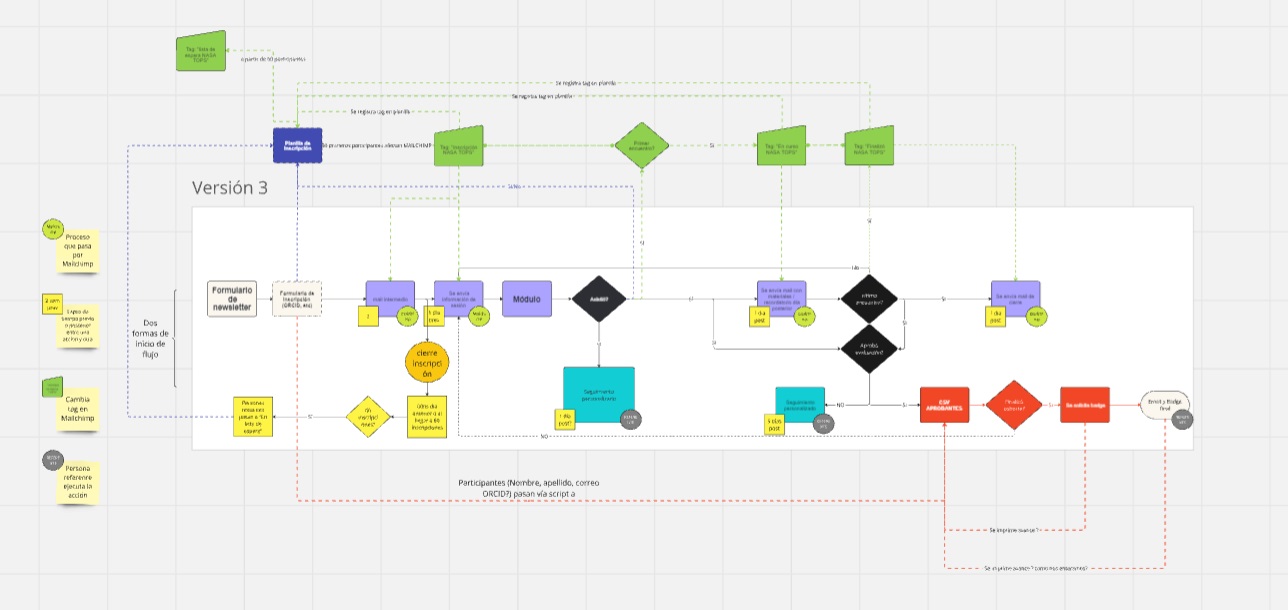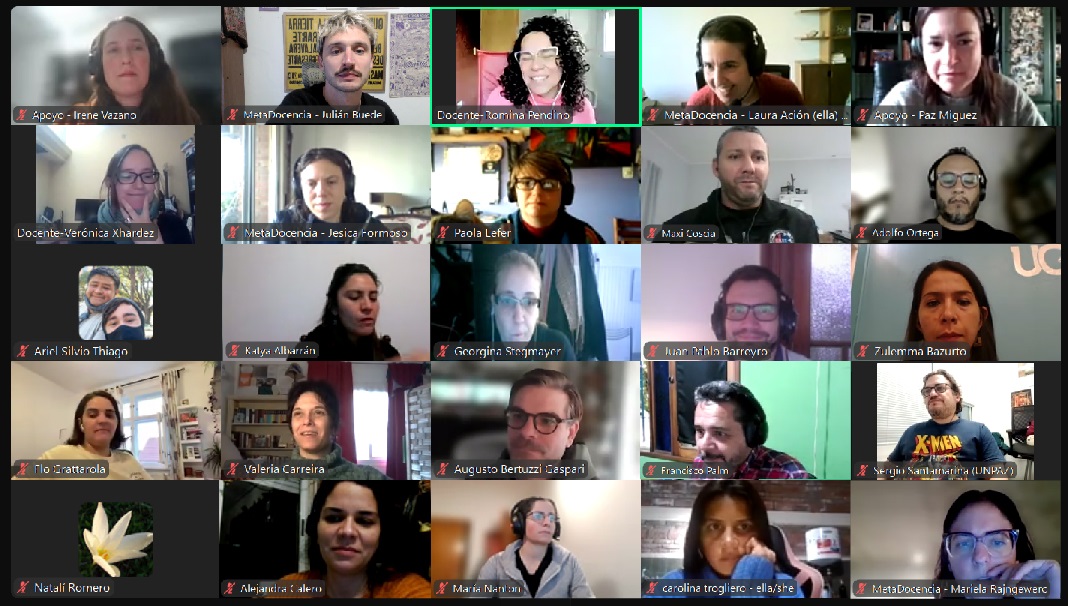Our Journey to Contextualize Knowledge and Teach Open Science in Spanish
Since partnering with NASA to champion Open Science, as we mentioned in this post, we began designing, developing, contextualizing, and implementing virtual training cohorts for Spanish speakers, covering the five modules of Open Science 101, originally designed for English speakers and high-income research environments.
We dedicated a semester to planning within our pillars of Training, Contextualization, and Community, as well as the transversal areas of Infrastructure, Impact Measurement, and Communication. The purpose was to combine our experience as virtual trainers with the collaborative work of contextualizing knowledge from and for the regions of our Spanish-speaking community, culminating in the launch of our Latin America Transforms to Open Science (ALTa) cohorts.
How did we do it?
We share part of the process with you:
-
We started the year with the Exploration Mission: a series of conversations to discuss key ideas, common challenges, and mitigation strategies in Latin America with other communities. Ninety-four people from 18 countries in the region participated, 25 of whom were members of communities of practice and organizations linked to various aspects of the scientific process. Many collective, critical, and powerful reflections emerged in these discussions to project wills and strategies toward more inclusive, open, and collaborative practices. More on these reflections in this publication.
-
Simultaneously, we recruited an a group of collaborators through the Polen Project to drive the contextualization efforts and join the work plan for Contextualization through the Polen Project, which we discuss further in another publication.
-
The proposal included contextualizing and teaching the content. This entailed launching virtual cohorts in Spanish that foster an approach to the principles and practices of Open Science while promoting exchange, dialogue, and learning among participants. At MetaDocencia we defined, from the design stage, the involvement of a diverse set of individuals from our community and team, experts in the topics but with diverse professional backgrounds and extensive teaching experience. In response, we worked in five teams, one for each module, for two months selecting, prioritizing, and adjusting the NASA TOPS content based on experience and our Latin American perspective. This involved not only deciding what content to teach but also how to teach it: defining the dynamics of work and exchange, outlining activities and formative exercises, designing presentations and materials, and creating the roadmap for each class. A diverse team of 16 professionals brought expertise, dedication, and adaptability to the curriculum design stage. These ingredients were key to achieving, in record time, the beta version of each of the six sessions of ALTa CA 1, the first edition of our cohorts. Based on the experience and lessons learned from this pilot cohort, currently underway, we will continue to adjust and improve the pedagogical proposal for future editions.
-
This development also involved designing a workflow to ensure infrastructure and communication for all participants. Once our roadmap was designed by the training team, the Infrastructure area began to think about how to articulate the tools available to manage every logistical aspect of the cohort. A workflow was designed, going through three versions until the final one was reached, covering every aspect of the cohort, from registration to certification. This involved defining the flow and interaction between areas; how communications would be triggered from registration and through which actions the different areas would receive the necessary information to successfully.
 Cross-functional workflow used to plan the cohort infrastructure.
Cross-functional workflow used to plan the cohort infrastructure.
-
Additionally, we started considering the documentary structure of the information, which files would be necessary and where they would reside, and the permissions needed to ensure the security of participants’ information. Once the criteria were defined, we began to generate the folder structure in our cloud infrastructure, modified the website, and configured the tools for instruction, such as calendar and video call events. We worked collaboratively to automate the information flow as efficiently as possible, thereby avoiding manual errors in tracking attendance and approvals.
-
We maintained constant coordination with the NASA TOPS team to ensure content integrity and certification. At the same time, we created a representative, regionally contextualized version that highlights the efforts, experience, and learnings on Open Science already present in Latin America and other regions conducting research with limited resources and primarily in non-English languages.
Results?
The first pilot cohort began on Wednesday, June 26th, with more than 100 people enrolling. This overwhelming interest has led to a second edition starting on Saturday, August 24th, at 9 a.m. (UTC -3), which is already full. This success projects us to hold a third cohort in 2024.
Each edition of our ALTa Open Science mission will recapture the incredible experience of coming together, dialoguing, and enriching knowledge in the community. And this is just the beginning!
 Screenshot from the first meeting of the first edition of ALTa Open Science.
Screenshot from the first meeting of the first edition of ALTa Open Science.
If you want to read more, exchange ideas on these topics, or you are interested in participating, we invite you to join our #alta-ciencia-abierta channel on Slack (English also welcome in the #english channel).
Acknowledgements
This publication was made possible by a grant from the Chan Zuckerberg Initiative (DOI: 10.5281/zenodo.7386372), NASA grants 80NSSC23K0854 (DOI: 10.5281/zenodo.8215455), 80NSSC23K0857 (DOI: 10.5281/zenodo.8250978), and 80NSSC23K0861 (DOI: 10.5281/zenodo.8212072), and grant DAF2021-239366 with DOI https://doi.org/10.37921/522107izqogv from the Chan Zuckerberg Initiative DAF, an advised fund of the Silicon Valley Community Foundation (Funder DOI 10.13039/100014989).
Did you like this post? You can freely reuse it under the license CC by 4.0; you just have to cite it.
This is the quote that we recommend you use to reference it: Vazano, I., Formoso, J., Buede, J., Ación, L., Ascenzi, L., Míguez, M. P., Pendino, R., López, S., & Xhardez, V. (2024). Our Journey to Contextualize Knowledge and Teach Open Science in Spanish. Zenodo. https://doi.org/10.5281/zenodo.13367857